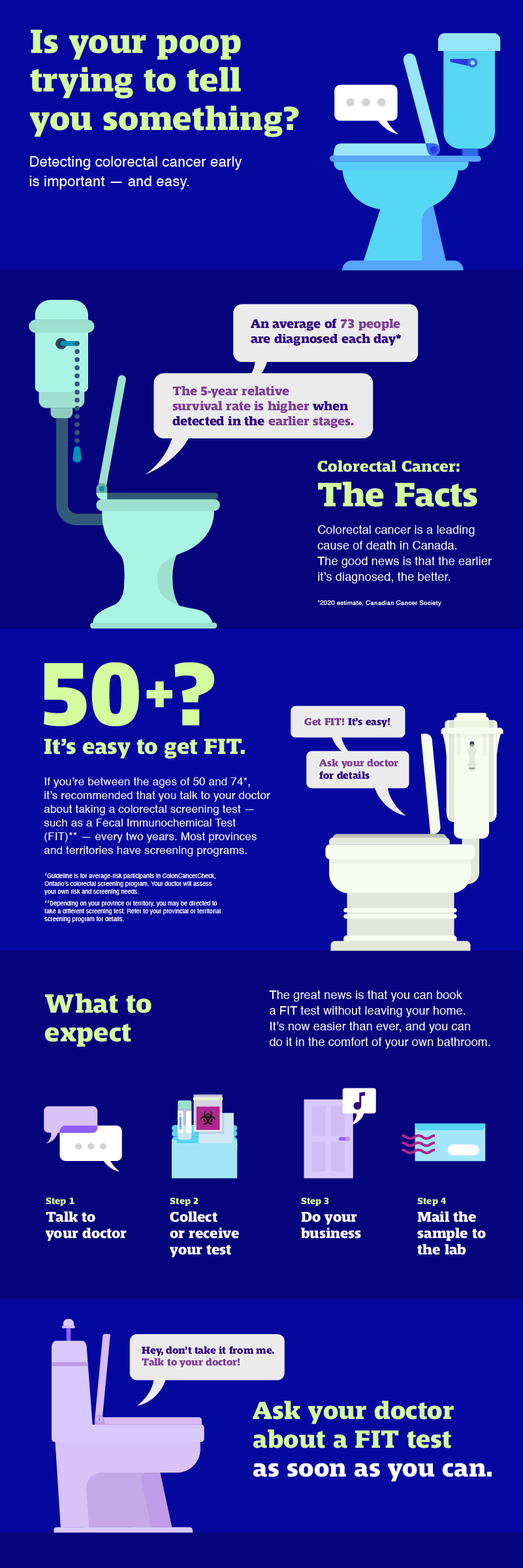Here’s a little bathroom reading that could save your life.1
Did you know that colorectal cancer was expected to be the third-most common cancer in Canada last year?2 That it’s expected to affect 1 in 14 men in their lifetime, and 1 in 18 women?3 Did you know that it’s the second-leading cause of cancer death in men and women combined,4 and an estimated 9,700 Canadians will have died from it in 2020?5
One piece of good news: the earlier colorectal cancer is diagnosed, the better. When the cancer is detected in the earlier stages of the disease, the 5-year relative survival rate is higher.6
The point is: Colorectal cancer is common and deadly, which is why everyone over 50 should get their poop tested on a regular basis.
It’s never been easier to get a FIT test
If you’re at average risk for colorectal cancer, Cancer Care Ontario recommends that you take a Fecal Immunochemical Test (FIT) every two years between the ages of 50 and 74.7 (Some provinces offer another test. Refer to your provincial screening program for details.)
How do you know whether you’re at average risk? Your doctor will determine this, but it typically refers to people who have no first-degree relatives who have been diagnosed with colorectal cancer, nor a history of pre-cancerous colorectal polyps.8.
Most provinces and territories have FIT screening programs
Another piece of good news? Most provinces and territories have screening programs in place, and it’s easier than ever to take part.
This infographic explains how to get your screening done. The exact details (and which test you’ll take) may depend on the province or territory. The Canadian Cancer Society has helpfully set up this page9 to direct you to the resources that are available in your location.
No matter where you live, the process starts with a conversation with your doctor and it involves collecting a sample in the comfort of your own bathroom and sending it to the lab via mail10 — that’s right, you don’t have to go do your business anywhere else.

One final reason to get FIT
Colorectal cancer usually doesn’t present any symptoms in the early stages.11
So if you want to know if your poop is trying to tell you something, you’ll have to get it tested. Thankfully the whole business is as easy as possible. Talk to your doctor and get FIT soon.
- https://www.nejm.org/doi/full/10.1056/nejmoa1300720
- https://www.cancer.ca/en/cancer-information/cancer-type/colorectal/statistics/?region=on
- https://www.canada.ca/en/public-health/services/chronic-diseases/cancer/colorectal-cancer.html
- https://www.colorectalcancercanada.com/colorectal-cancer-screening-in-ontario-is-changing-to-the-fit/
- https://www.cancer.ca/en/cancer-information/cancer-type/colorectal/statistics/?region=on
- https://www.cancer.ca/en/cancer-information/cancer-type/colorectal/prognosis-and-survival/survival-statistics/?region=on
- https://www.cancercareontario.ca/en/guidelines-advice/cancer-continuum/screening/resources-healthcare-providers/colorectal-cancer-screening-summary
- https://www.cancercareontario.ca/en/guidelines-advice/cancer-continuum/screening/resources-healthcare-providers/colorectal-cancer-screening-summary
- https://www.cancer.ca/en/prevention-and-screening/reduce-cancer-risk/find-cancer-early/get-screened-for-colorectal-cancer/how-do-i-find-a-colorectal-cancer-screening-program/?region=on
- https://www.cancercareontario.ca/en/guidelines-advice/cancer-continuum/screening/resources-healthcare-providers/colorectal-cancer-screening-summary
- https://www.cancercare.org/publications/116-colorectal_cancer_the_importance_of_screening_and_early_detection.


